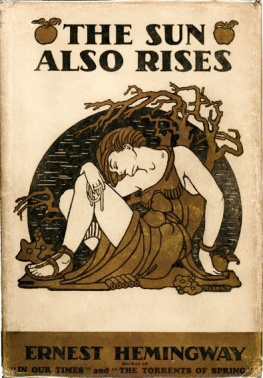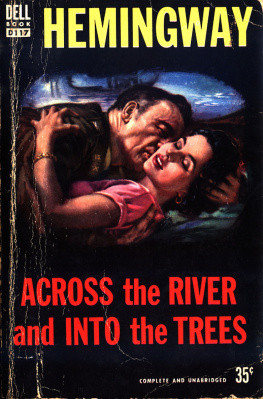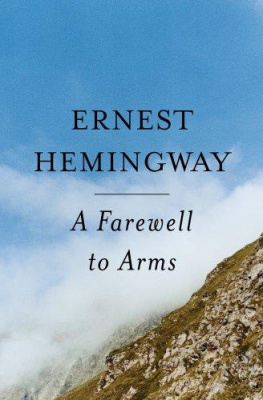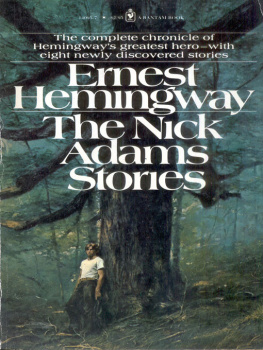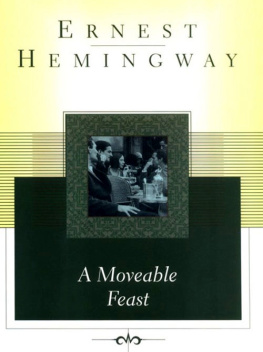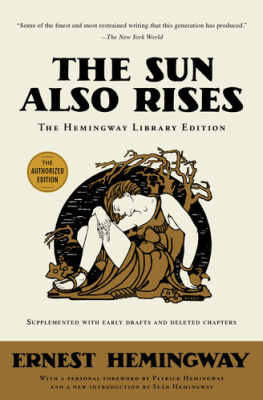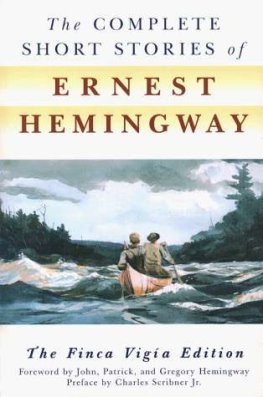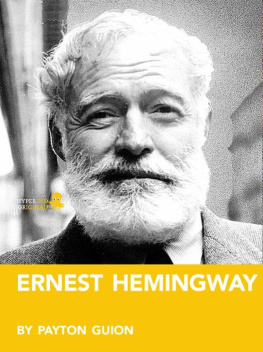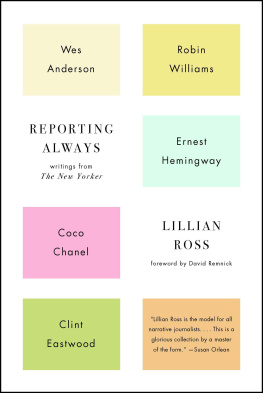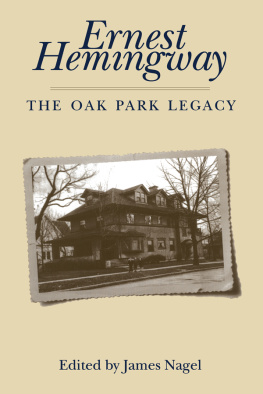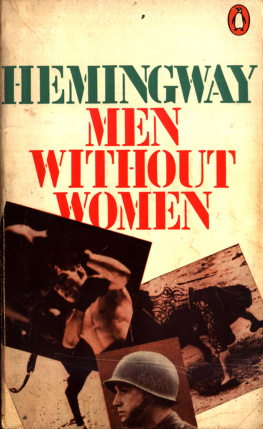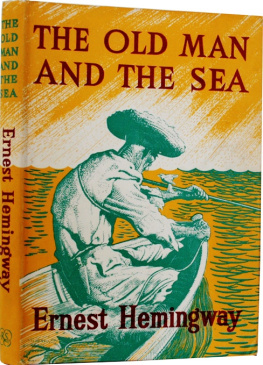Ernest Hemingway - The Sun Also Rises
Here you can read online Ernest Hemingway - The Sun Also Rises full text of the book (entire story) in english for free. Download pdf and epub, get meaning, cover and reviews about this ebook. genre: Art. Description of the work, (preface) as well as reviews are available. Best literature library LitArk.com created for fans of good reading and offers a wide selection of genres:
Romance novel
Science fiction
Adventure
Detective
Science
History
Home and family
Prose
Art
Politics
Computer
Non-fiction
Religion
Business
Children
Humor
Choose a favorite category and find really read worthwhile books. Enjoy immersion in the world of imagination, feel the emotions of the characters or learn something new for yourself, make an fascinating discovery.
- Book:The Sun Also Rises
- Author:
- Genre:
- Rating:5 / 5
- Favourites:Add to favourites
- Your mark:
- 100
- 1
- 2
- 3
- 4
- 5
The Sun Also Rises: summary, description and annotation
We offer to read an annotation, description, summary or preface (depends on what the author of the book "The Sun Also Rises" wrote himself). If you haven't found the necessary information about the book — write in the comments, we will try to find it.
The Sun Also Rises — read online for free the complete book (whole text) full work
Below is the text of the book, divided by pages. System saving the place of the last page read, allows you to conveniently read the book "The Sun Also Rises" online for free, without having to search again every time where you left off. Put a bookmark, and you can go to the page where you finished reading at any time.
Font size:
Interval:
Bookmark:
by ErnestHemingway
This book is for Hadley
and for John Hadley Nicanor
"You areall a lost generation."
GERTRUDE STEININ CONVERSATION
"Onegeneration passeth away, and another generation cometh; but the earth abidethforever... The sun also ariseth, and the sun goeth down, and hasteth to theplace where he arose... The wind goeth toward the south, and turneth about untothe north; it whirleth about continually, and the wind returneth againaccording to his circuits.... All the rivers run into the sea; yet the sea isnot full; unto the place from whence the rivers come, thither they return again."
ECCLESIASTES
Robert Cohn was once middleweightboxing champion of Princeton. Do not think that I am very much impressed bythat as a boxing title, but it meant a lot to Cohn. He cared nothing forboxing, in fact he disliked it, but he learned it painfully and thoroughly tocounteract the feeling of inferiority and shyness he had felt on being treatedas a Jew at Princeton. There was a certain inner comfort in knowing he couldknock down anybody who was snooty to him, although, being very shy and athoroughly nice boy, he never fought except in the gym. He was Spider Kelly'sstar pupil. Spider Kelly taught all his young gentlemen to box like featherweights,no matter whether they weighed one hundred and five or two hundred and fivepounds. But it seemed to fit Cohn. He was really very fast. He was so good thatSpider promptly overmatched him and got his nose permanently flattened. Thisincreased Cohn's distaste for boxing, but it gave him a certain satisfaction ofsome strange sort, and it certainly improved his nose. In his last year atPrinceton he read too much and took to wearing spectacles. I never met any oneof his class who remembered him. They did not even remember that he wasmiddleweight boxing champion.
I mistrust all frank and simplepeople, especially when their stories hold together, and I always had asuspicion that perhaps Robert Cohn had never been middleweight boxing champion,and that perhaps a horse had stepped on his face, or that maybe his mother hadbeen frightened or seen something, or that he had, maybe, bumped into somethingas a young child, but I finally had somebody verify the story from SpiderKelly. Spider Kelly not only remembered Cohn. He had often wondered what hadbecome of him.
Robert Cohn was a member, throughhis father, of one of the richest Jewish families in New York, and through hismother of one of the oldest. At the military school where he prepped forPrinceton, and played a very good end on the football team, no one had made himrace-conscious. No one had ever made him feel he was a Jew, and hence anydifferent from anybody else, until he went to Princeton. He was a nice boy, afriendly boy, and very shy, and it made him bitter. He took it out in boxing,and he came out of Princeton with painful self-consciousness and the flattenednose, and was married by the first girl who was nice to him. He was marriedfive years, had three children, lost most of the fifty thousand dollars hisfather left him, the balance of the estate having gone to his mother, hardenedinto a rather unattractive mould under domestic unhappiness with a rich wife;and just when he had made up his mind to leave his wife she left him and went offwith a miniature-painter. As he had been thinking for months about leaving hiswife and had not done it because it would be too cruel to deprive her ofhimself, her departure was a very healthful shock.
The divorce was arranged and RobertCohn went out to the Coast. In California he fell among literary people and, ashe still had a little of the fifty thousand left, in a short time he wasbacking a review of the Arts. The review commenced publication in Carmel,California, and finished in Provincetown, Massachusetts. By that time Cohn, whohad been regarded purely as an angel, and whose name had appeared on theeditorial page merely as a member of the advisory board, had become the soleeditor. It was his money and he discovered he liked the authority of editing.He was sorry when the magazine became too expensive and he had to give it up.
By that time, though, he had otherthings to worry about. He had been taken in hand by a lady who hoped to risewith the magazine. She was very forceful, and Cohn never had a chance of notbeing taken in hand. Also he was sure that he loved her. When this lady sawthat the magazine was not going to rise, she became a little disgusted withCohn and decided that she might as well get what there was to get while therewas still something available, so she urged that they go to Europe, where Cohncould write. They came to Europe, where the lady had been educated, and stayedthree years. During these three years, the first spent in travel, the last twoin Paris, Robert Cohn had two friends, Braddocks and myself. Braddocks was hisliterary friend. I was his tennis friend.
The lady who had him, her name wasFrances, found toward the end of the second year that her looks were going, andher attitude toward Robert changed from one of careless possession andexploitation to the absolute determination that he should marry her. Duringthis time Robert's mother had settled an allowance on him, about three hundreddollars a month. During two years and a half I do not believe that Robert Cohnlooked at another woman. He was fairly happy, except that, like many peopleliving in Europe, he would rather have been in America, and he had discoveredwriting. He wrote a novel, and it was not really such a bad novel as thecritics later called it, although it was a very poor novel. He read many books,played bridge, played tennis, and boxed at a local gymnasium.
I first became aware of his lady'sattitude toward him one night after the three of us had dined together. We haddined at l'Avenue's and afterward went to the Caf de Versailles for coffee. Wehad several fines after the coffee,and I said I must be going. Cohn had been talking about the two of us going offsomewhere on a weekend trip. He wanted to get out of town and get in a goodwalk. I suggested we fly to Strasbourg and walk up to Saint Odile, or somewhereor other in Alsace. "I know a girl in Strasbourg who can show us thetown," I said.
Somebody kicked me under the table.I thought it was accidental and went on: "She's been there two years andknows everything there is to know about the town. She's a swell girl."
I was kicked again under the tableand, looking, saw Frances, Robert's lady, her chin lifting and her facehardening.
"Hell," I said, "whygo to Strasbourg? We could go up to Bruges, or to the Ardennes."
Cohn looked relieved. I was notkicked again. I said good-night and went out. Cohn said he wanted to buy apaper and would walk to the corner with me. "For God's sake," hesaid, "why did you say that about that girl in Strasbourg for? Didn't yousee Frances?"
"No, why should I? If I know anAmerican girl that lives in Strasbourg what the hell is it to Frances?"
"It doesn't make anydifference. Any girl. I couldn't go, that would be all."
"Don't be silly."
"You don't know Frances. Anygirl at all. Didn't you see the way she looked?"
"Oh, well," I said,"let's go to Senlis."
"Don't get sore."
"I'm not sore. Senlis is a goodplace and we can stay at the Grand Cerf and take a hike in the woods and comehome."
"Good, that will be fine."
"Well, I'll see you to-morrowat the courts," I said.
"Good-night, Jake," hesaid, and started back to the caf.
"You forgot to get yourpaper," I said.
"That's so." He walkedwith me up to the kiosque at the corner. "You are not sore, are you,Jake?" He turned with the paper in his hand.
"No, why should I be?"
"See you at tennis," hesaid. I watched him walk back to the caf holding his paper. I rather liked himand evidently she led him quite a life.
Font size:
Interval:
Bookmark:
Similar books «The Sun Also Rises»
Look at similar books to The Sun Also Rises. We have selected literature similar in name and meaning in the hope of providing readers with more options to find new, interesting, not yet read works.
Discussion, reviews of the book The Sun Also Rises and just readers' own opinions. Leave your comments, write what you think about the work, its meaning or the main characters. Specify what exactly you liked and what you didn't like, and why you think so.

